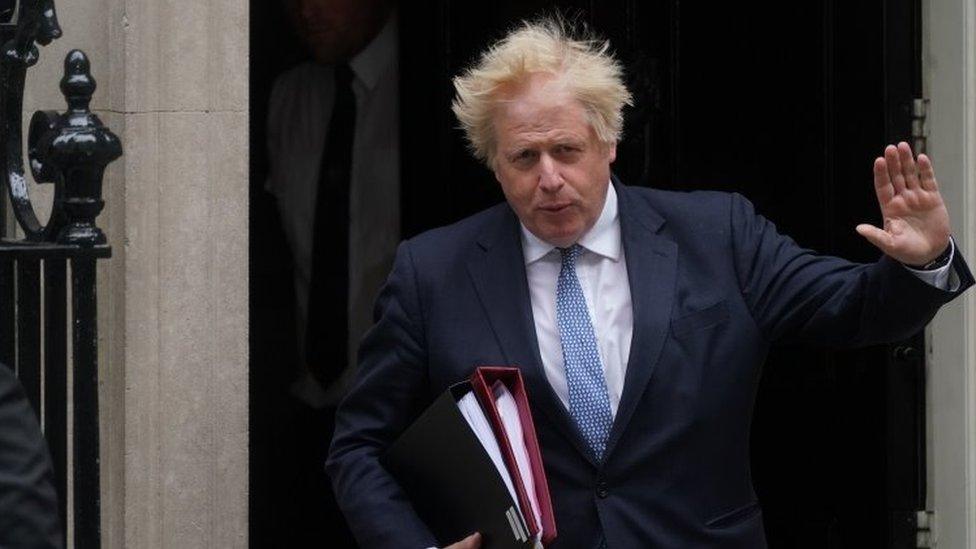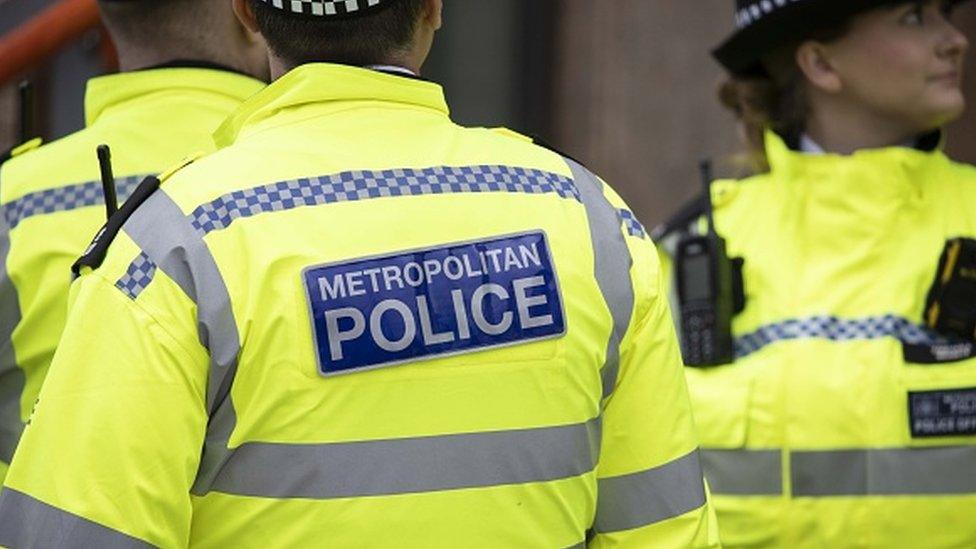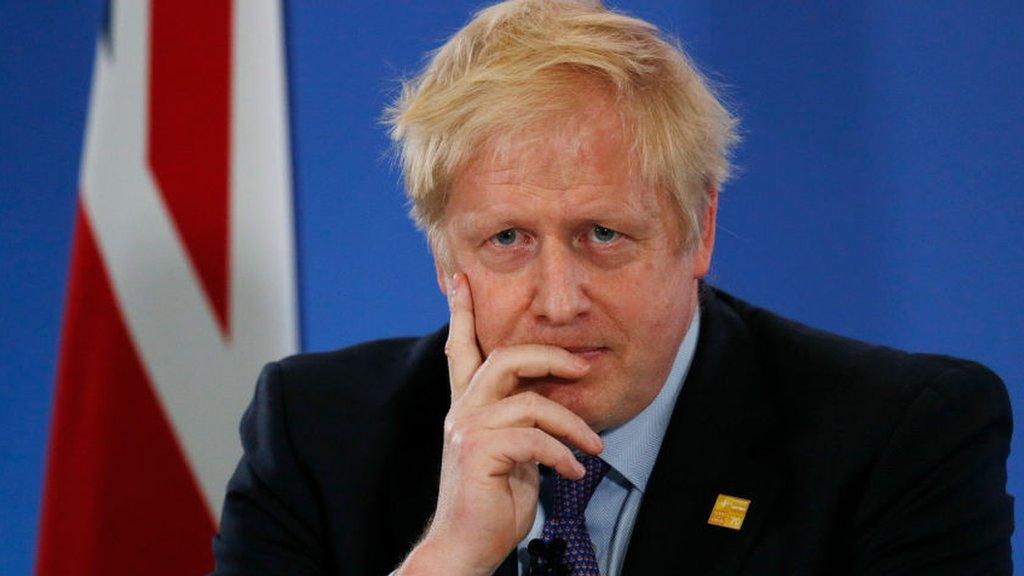What's happening in Parliament this week?
- Published

There is speculation that Prime Minister Boris Johnson could face a vote on his leadership
Nothing energises Westminster like the prospect of a challenge to the prime minister.
The (as I write, unconfirmed) possibility of a confidence vote on Boris Johnson's leadership by Conservative MPs turns much of the coming week's parliamentary activity into an audition for potential successors.
Nothing disloyal - just potential contenders seeking to strut their stuff, show their potential and attract support.
As luck would have it, none of those possible successors in the cabinet has a question time this week.
But there are always statements and urgent questions which could provide them with a chance to perform, or to belly-flop, and offer their opponents a chance to deliver a professional foul.
With that in mind, keep an eye on Chancellor Rishi Sunak's appearance before the Treasury Committee on Monday.
Powers examined
Also on Monday, The National Security Bill heads the list of big-ticket legislation starting its journey through Parliament after the recess.
The bill aims to modernise existing espionage laws and give police powers to deal with a much broader range of threats to the UK, its society and economy. It includes "new tools of last resort" to manage those who pose a threat but have not met the threshold for prosecution.
And it will also require people in the UK to register their work for foreign governments. This aspect of the bill has attracted the attention of an interesting cross-party alliance of heavyweight backbench MPs who will be seeking to toughen up measures to prevent foreign powers influencing UK politics.
They're focused on such issues as ensuring that there are rules to control the activities of lawyers, as well as bankers, who facilitate oligarchs and kleptocrats. The MPs will also push for registration of entities that they see as pushing the interests of foreign countries - which would extend from lobbyists to, for example, China-funded Confucius Institutes operating in UK universities.
Conservative backbench MP Bob Seeley gave an early glimpse of their agenda in a debate in Westminster Hall on 25 May, external.

The National Security Bill aims to give police broader powers to deal with threats to the UK
Watch out for another interesting intervention from the former Lord Chancellor, Robert Buckland, who is planning to push an amendment creating a public-interest defence for whistleblowers and journalists, and may foreshadow that in his speech in the debate.
Wednesday sees the second reading of the Levelling Up and Regeneration Bill, Secretary of State Michael Gove's package of measures to address regional inequalities in productivity, health, incomes, and opportunity.
This is a central part of the government's agenda, and includes such ideas as allowing community use of vacant shops and "street votes" on development issues.
But the bill is not uncontroversial on the Conservative benches, because the key section on planning gives sweeping powers to Mr Gove and his successors to drive local development.
Given the fiendish complexity of planning law in England, expect the most significant action around this bill two take place during its detailed consideration in committee, and especially at report stage (the point at which amendments are debated by the whole House), as well as later in the House of Lords.
Aside from the big-ticket legislation, Thursday's backbench debate on strategic priorities for the water industry regulator, OFWAT, will revive the issue of sewage discharges into watercourses in England.
Remember, this gave the government (and its backbenchers) so much grief during the passage of the Environment Bill. The public backlash against the level of discharges by water companies and environmental damage they cause was a painful reminder of the potency of green issues.
Environmental Audit Committee chairman Philip Dunne and former Treasury Minister Jesse Norman are leading the debate, which will follow up on the committee's recommendations on water quality in rivers, and the promise of major spending on sewage treatment over the next five-year pricing period.
I suspect whichever minister replies had better have some good answers for them.
Tricky legislation
On Wednesday in the Lords, peers will launch a more technical but potentially tricky piece of legislation, in the Identity and Language (Northern Ireland) Bill, which will provide for the recognition and protection of the Irish language and the development of the Ulster Scots and Ulster British tradition.
It creates two commissioners and an Office of Identity and Cultural Expression for Northern Ireland.
Peers will also embark (on Tuesday) on their detailed consideration of the Schools Bill - but remember this is the committee stage, where issues are probed, but rarely pushed back to a vote.

A Labour peer has called for a debate on the UK's defence policy
Elsewhere fresh scrutiny of defence policy and the Integrated Review, which is now seen as having been overtaken by the war in Ukraine, has been prompted by Labour peer and arch-Europhile Lord Liddell.
He has secured a debate on Thursday entitled the "impact of the conflict in Ukraine on the Integrated Defence Review and the case for the UK strengthening its relationships with the EU, other European Allies and its commitment to Nato".
Chancellor grilled
The week's committee highlight (on Monday at 13:45 BST) is the Treasury appearance by the Chancellor Rishi Sunak, who will discuss his new package to address the soaring cost of living.
Other action includes Northern Ireland (Tuesday 09:30) looking at the governments plans to address the legacy of Northern Ireland's past, with witnesses led by Alyson Kilpatrick, Chief Commissioner at Northern Ireland Human Rights Commission, and Ian Jeffers of the Commission for Victims and Survivors.
On Tuesday from 10:00, the Digital, Culture, Media and Sport sub committee looking at the Online Safety Bill will hear evidence about user safety and civil liberties online.
We can also expect testimony on contentious proposed powers for the secretary of state to issue directions to the watchdog body, Ofcom.
Meanwhile, the ubiquitous former chief Brexit negotiator Lord Frost is before Public Administration and Constitutional Affairs discussing his negotiation of the Withdrawal Agreement, Northern Ireland Protocol and the Trade and Cooperation Agreement with the EU. That appearance - from 10:00 on Tuesday - is part of the committee's inquiry into the scrutiny of international treaties.
Lastly, Transport (Wednesday 09:30) will be hearing from the bus industry and manufacturers about the progress of the National Bus Strategy, one year in.
Related topics
- Published10 May 2022

- Published7 June 2022

